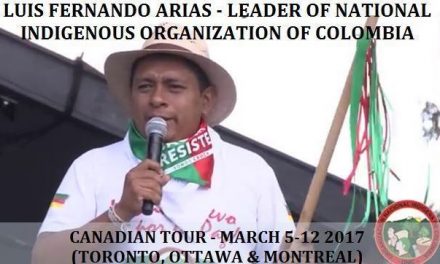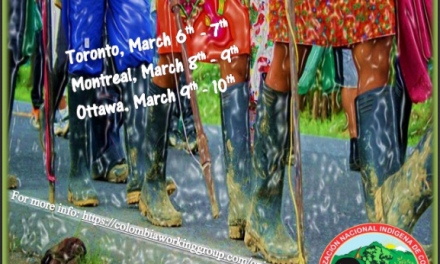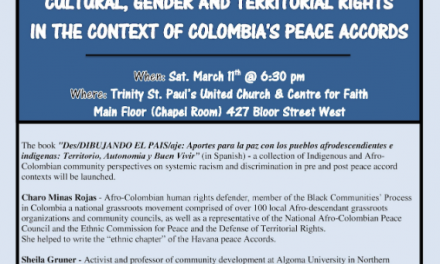Conflict and Historical Memory in Colombia / Conflicto y Memoria Histórica en Colombia
September 22, 2015
Friday, October 2, 2015
Friends House – 60 Lowther Ave., Toronto, ON
6:30 – 8:30
Launch of Historical Memory Centre final report, “Basta ya! Colombia: Memorias de guerra y dignidad” (“Basta Ya! Memories of War and Dignity in Colombia”).
Join us at the Friends House (60 Lowther Avenue) for a moving and important evening. We are coming together for the formal launch of the report authored by the Colombian National Centre for Historical Memory, “¡Basta ya! Colombia: Memorias de guerra y dignidad.” The report documents the internal armed conflict that has ravaged Colombia, presents the voices of the survivors of this violence, and offers the Colombian government recommendations for moving forward with accountability, dignity, and hope. The report comes at a hugely important moment for Colombia. Peace talks between the FARC guerrilla insurgency and the Colombian government are now in their third year. Popular organizations continue to bring forward proposals for resolving the underlying causes of the conflict. The reclaiming, reconfiguration, and mass participation in historical memory is being used as a tool to promote change and seek truth and reparation.
The event will feature presentations from the report’s main authors, as well as Indigenous and international perspectives on the challenges for peace in Colombia. We invite you to come, listen, discuss, and learn with us.
Main Speakers
- Martha Nubia Bello, Technical Director of the National Memorial Museum National Centre for Historical Memory
- Andrés Suárez, Advisor to the Director General National Centre for Historical Memory
- Weildler Guerra Curvelo, Wayuu Anthropologist, Universidad de los Andes, “An Indigenous Perspective of Peace: its Aesthetic and Ritual”
Commentary
- Adam Isacson, Senior Associate for Regional Security Policy, Washington Office on Latin America (WOLA)
-more information on ¡Basta ya!:
We are grateful to all of our sponsors and supporters:
- Social Science and Humanities Research Council
- University of Toronto Department of History
- Office of the Vice-Principal Research, University of Toronto-Mississauga
- Latin American Studies Program at the University of Toronto
- McGill University Department of History
- University of British Colombia Vice Principal Research / VPRI Knowledge Mobilization Grant
- Réseau d’Études sur l’Amérique latine à Montréal / The Latin American Research Network of Montreal
- Centre for Research on Latin America and the Caribbean (CERLAC) at York University





